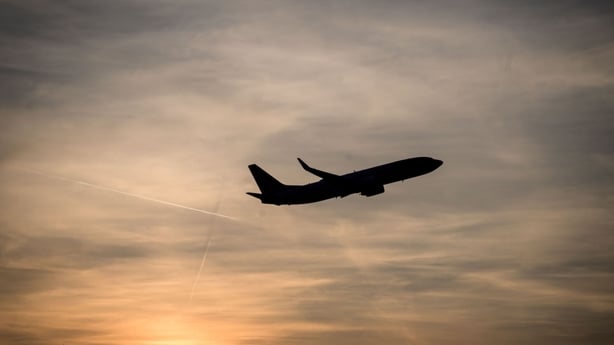The global airline industry will become profitable again next year for the first time since 2019 as a resurgence of air travel continues following nearly two years of Covid-19 restrictions, an industry association said today.
Airlines lost tens of billions of dollars in 2020 and 2021 due to the pandemic, but air travel has partially recovered and some airports have struggled to cope.
The International Air Transport Association (IATA) now expects a net profit of $4.7 billion for the industry next year, with more than 4 billion passengers set to fly. It had previously said only that profits were "within reach" in 2023.
For 2022, IATA narrowed its forecast for industry-wide losses to $6.9 billion from $9.7 billion.
"That is a great achievement considering the scale of the financial and economic damage caused by government-imposed pandemic restrictions," said IATA Director General Willie Walsh, commenting on the projected return to profit in 2023.
But the former Aer Lingus and IAG boss warned that many airlines will continue to struggle next year, citing regulations, high costs and inconsistent government policies - and reopening a long-running war of words with airports.
"It's very important that everybody understands just how fragile the recovery is," he said.
"Yes we are recovering; yes the momentum is improving; yes, we expect it to continue to improve in 2023," Walsh told an annual media briefing.
"But the margins we are operating with are very small and we cannot tolerate a situation where airports in particular attempt to gouge airlines and their passengers by significant increase in airport charges. Every single cent matters," he added.
Airports complain they did not get state support available to traditional carriers and have pointed the finger back at airlines in a row over the pandemic-linked travel disruption. The airport industry's trade association was not immediately available for comment.
IATA believes global air traffic levels will return to pre-Covid or 2019 levels by 2024, led by the US and with Asia-Pacific "notably lagging."
IATA chief economist Marie Owens Thomsen warned that the risk to the latest forecasts on the sector remained "skewed to the downside" and the "key variable" would be China.
Beijing has begun easing draconian zero-Covid policies designed to stamp out transmission. It may announce 10 new Covid-19 easing measures as early as tomorrow, two sources with knowledge of the matter told Reuters on Monday, supplementing 20 unveiled in November.
If China does not loosen restrictions, airlines' profitability would be affected.
Another risk for the 2023 outlook is that some economies fall into recession, it said.
Walsh also hit out at jet manufacturers who were struggling to deliver aircraft and blaming their supply chains.
"It is causing a lot of frustration. It is adding to the cost base. When I speak privately to CEOs it's creating a lot of anger," he said.
Walsh said airlines had survived the worst of the downturns, though Europe's fragmented market remained an area to watch.
"I think the challenge for some airlines still exists, because as we've seen, the industry is still only marginally profitable. In fact, in Europe we can say we are breakeven," Walsh said.
"So there's clearly still financial pressure. The difference is airlines are generating cash now. Liquidity was the critical issue," he stated.
IATA warn of higher fares from green transition
Willie Walsh also said today that airline passengers face higher ticket prices as the industry moves towards its target of reducing emissions to net zero by 2050.
He called for swifter action in Europe to drive up scarce production of greener Sustainable Aviation Fuel (SAF).

Air fares have already jumped this year as a result of higher prices for conventional fossil-based jet fuel.
"You cannot expect an industry making on average $1 profit per customer to absorb the increases we've seen," Walsh told reporters at an annual media briefing.
"Going forward as we see increases in carbon costs - there has to be an impact on ticket prices as the industry transitions to net zero. The airlines cannot absorb increased costs."
Environmental groups argue that air higher travel costs will help to rein in emissions by curbing growth in traffic.
Mr Walsh praised efforts by the US to lift output of clean fuels, in apparent contrast with European objections that new US incentives could create an uneven playing field.
"In the US it is recognised that Sustainable Aviation Fuels are part of the answer and they are heavily focused on additional production," Walsh said.
He dismissed as "nonsense" European Union moves to oblige airports to offer increasing supplies of SAF, which is not widely available.
"Europe's answer to the problem penalises people," he said.
In July, the European Parliament backed rules on aviation fuel that set binding targets for the replacement of kerosene with less polluting sources, while extending the definition of what a green fuel could be.
In the US, the Biden administration has launched a government challenge to supply at least 3 billion gallons of SAF per year by 2030.
The airline sector is considered one of the most difficult to decarbonise as fuel for flights cannot be easily replaced with other kinds of power.
This year's US Inflation Reduction Act includes significant subsidies to the SAF industry in the form of tax credits, but European industry leaders including the head of planemaker Airbus AIR.PA have said the legislation is unfair.

